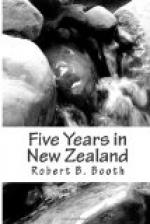If these men had gone upon a farm or sheep-run for two or three years’ apprenticeship, investing their money safely meanwhile, they might have become in a few more years, prosperous colonists. It was their absolute ignorance, added to a want of sufficient means to carry out what they undertook to do, that brought depression and failure upon them. And a percentage of the emigrants who go to the Colonies act under similar circumstances as they did, and from being on arrival strong, hopeful and brave, they, from lack of something in themselves or from want of the needful advice and sense to adopt it, gradually deteriorate past all recovery. I recollect the billiard-marker at one of the Christchurch hotels was the younger son of a baronet. He worked as billiard-marker for his food, and as much alcohol as he could get. I believe he was never unfit to mark, and never quite sober. He died at his post, but not before he had learned that he had succeeded to the baronetcy, and seen relatives who had come from home to search for and bring him back. It is a strange error of judgment which sends such men as this to the Colonies, but perhaps those who are responsible consider they are justified by the removal of the scapegrace and finally getting rid of him by any means.
On our return to Christchurch I met my old friend and fellow voyager T. Smith, who had just been appointed overseer of a sheep and cattle station down south. He pressed me to accompany him to the locality, pending arrival of letters from home, and as I had nothing just then on hand, I accepted his invitation. It seemed very apparent that I was fast becoming a rolling stone, but though I stuck to nothing long, it was not altogether my fault, and I was always at work, increasing my stock of experience, such as it was. This departure to Smith’s station on the Ashburton led me away on an entirely new line for some time.
The station to which Smith had been appointed overseer was about 100 miles from Christchurch. The owner did not live there, so the entire management was in Smith’s hands. The route lay across the Canterbury plains by a defined cart track, with accommodation houses at certain distances along its course, so no camping out was needed.
The Canterbury Plains are supposed to be the finest in the world, extending as they do, about 150 miles in length by 40 to 60 in width, and over this immense space there was not a forest tree or scarcely a shrub of any size to be met with, except a description of palm, called cabbage trees, which grow in parts along the river beds, and occasionally dot the adjacent plain. The plains are almost perfectly flat, with no undulations more than a few feet in height. They are intersected every ten to twenty miles by wide shallow river beds, which during the summer months, when the warm nor’-westers melt the snow and ice on the Alps, are often terrific torrents, impassable for days together, while at other times they are shingle interspersed with clear rapid streams, more or less shallow, and generally fordable with ordinary care. Some of the principal rivers such as the Rakaia, Rangatata and Waitaki, are at all times formidable.




